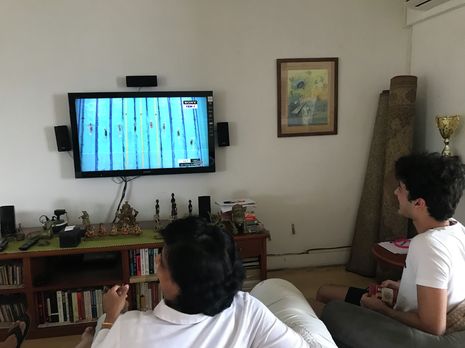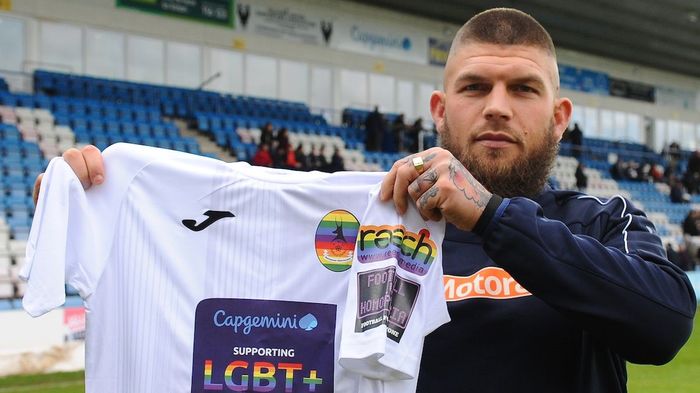New Olympic event: Family bonding
On watching this year’s Olympics with her family, Deputy Varsity Editor Akshata Kapoor contemplates how the games help bring them closer to each other

I tentatively tiptoe outside my room and peek into the living room where my mum works on her laptop, tapping away at the keyboard. As expected, a channel showing an Olympic event is playing on the television in front of her. My procrastination has reached the point where I decide to swallow my pride after the tiff that my mum and I have had and go sit with her. I wordlessly move towards the other end of the couch where she sits. Avoiding her glance, I look at the television.
“What’s playing?”
“Synchronised diving”
“The Olympics provide us with the perfect solution to fights over the TV remote”
A swimmer moves closer to the edge of the diving board; I edge closer to my mum. Our eyes are glued onto the screen as the two divers grimace and launch off the board. My stomach turns in sync with the somersaults they attempt; I’m not sure how to bring myself to apologise to my mum for my stand-offish behaviour. We hold our breath as the divers enter the water at the same time, making the tiniest splash as if they have simply slipped into the pool rather than jumped in from a height of 10 meters. They make everything look so effortless and graceful. I make the leap too, readying myself to initiate conversation. The panel of expert judges awards the divers a low score and, on cue, both mum and I launch into a torrent of indignations, exclaiming: “But they were so perfect!” and “That dive could not have been better!” I look straight ahead at the screen, but I know that we are both smiling. For the next hour, we watch different pairs synchronise their jumps and flips and somersaults too intensely for two people who don’t even know how to swim. If we watch closely enough, we could learn how to work well together, how to stop our words from narrowly missing what we mean to say, prevent our acts of love from slipping into misunderstandings and convoluted arguments. India is not participating in this event, so we cheer for every participant.
For as long as I can remember, the Olympics have been a permanent fixture on our television when they come around every four years. We’re hardly a sporty family; my brother and dad occasionally bond over cricket and football commentary, but it ends there. Even outside sports, we have very few common interests. The world of finance that my parents are a part of is unfamiliar to my brother and me. My father likes action movies, my brother is going through an adult-animation phase, my mum will only watch dramatic biopics, and I like my sappy rom-coms. Any discussion on politics inevitably results in a dinner-table fight with every member yelling “how could you possibly support [X]” and “what is wrong with you” and “is this what I raised you to believe in?”. Most of these interactions fall well within the bounds of classic family relationships and interactions, but I always found myself craving deeper connections — topics we could discuss without any awkwardness.
“If we watch closely enough, we too could learn how to work well together”
As my mum and I watched our first Olympic event of this year, I couldn’t help but be grateful to the games for giving me the space to form this connection. The Olympics provide us with the perfect solution to fights over the TV remote: whichever sport was on would please someone, either because it would be exciting to watch or because the competition between countries vying for the platform would make things interesting anyway. Where my family differ vastly in our political views, it is so easy for all of us to unite behind Indian archers, shooters and table-tennis players, ecstatic when they win and mournful when they lose. So many Indian players have the most inspirational stories leading up to their journey to the Olympics.
Like previous years, this year we dig through the overflowing fridge to scrounge up the last of the slightly-brown mangoes from this mango season and eat them while watching the games. None of us know anything about the sports we watch, but it’s always fun to see my mum try to make armchair commentary on skateboarding and triathlon, restraining ourselves from reminding her that the participants cannot hear what she’s screaming at the television. Instead, we look forward to when, five minutes into the event, she will nonchalantly Google the participants and tell us fun facts about them as if she has known all along. My dad will nod along, as if this new information allows him to understand the events better, and, like a classic Indian parent, he will question whether any remotely brown person on screen is of Indian origin. Even if they are not, he will take personal pride in their achievements.
This summer, with most activities in Mumbai impossible because of the lockdown, we will continue to follow the Olympics. My brother is on another continent, so we will discuss everything with him over FaceTime. My grandmother, who I have only seen through the screen for the past year, will call up and tell me what events she has been watching, and which sportswomen reminded her of me and my mum. Everything is so different from two Olympics ago when my brother and I would be sent to bed before the last events because we had school the next day. It’s scary to think that the next time we will all gather around the TV to watch the Olympics I will have (hopefully) graduated. But, for now, I can safely sit on the couch with my family, ignore my work, and comment on why the team deserved a better diving score.
 News / University Council rescinds University Centre membership20 February 2026
News / University Council rescinds University Centre membership20 February 2026 News / Hundreds of Cambridge academics demand vote on fate of vet course20 February 2026
News / Hundreds of Cambridge academics demand vote on fate of vet course20 February 2026 News / Judge Business School advisor resigns over Epstein and Andrew links18 February 2026
News / Judge Business School advisor resigns over Epstein and Andrew links18 February 2026 News / Union cancels event with Sri Lankan politician after Tamil societies express ‘profound outrage’20 February 2026
News / Union cancels event with Sri Lankan politician after Tamil societies express ‘profound outrage’20 February 2026 News / Caius students fail to pass Pride flag proposal20 February 2026
News / Caius students fail to pass Pride flag proposal20 February 2026











